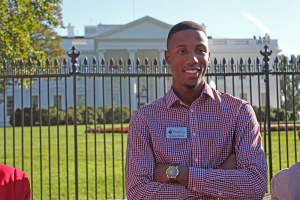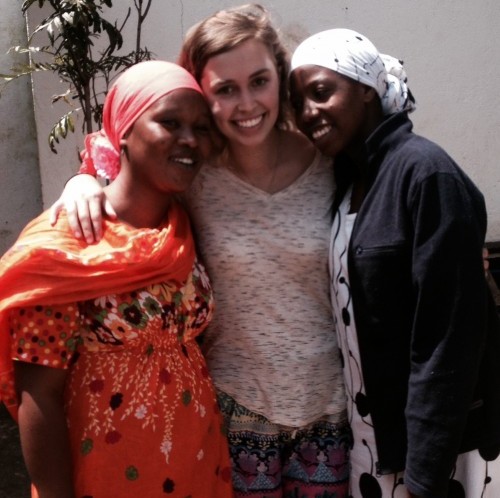There aren’t any blacks in Buenos Aires. I heard this many times before arriving. I heard it even more after arriving. Even so, I was prepared for it. My mother felt assured that I would be alright once I arrived in Buenos Aires, because she gave me personal hygiene supplies as if I were Noah and the plane was the Ark. She packed me two deodorants, two containers of shower gel, two contact solution containers, two tubes of toothpaste, the list continues. So I stepped on the plane with confidence and left the United States for the first time.
I lost that confidence after the first day. Normally, a person takes a shower, washes his hair with shampoo, and uses conditioner. In my case instead of bottled conditioner, I use a hair grease that is a little bit stronger. When I finished my first shower, after a long day and an even longer flight, I realized that I had forgotten one thing: the hair grease I needed at that exact moment. I didn’t have anything to hydrate my hair.
I saw the reality of my situation the first time I tried to buy this type of hair product. After the shower, I immediately went to a mini-mart around the corner of my house. I walked through the aisles searching for something sufficient. I saw different kinds of foods, a lot of one kind of beer—Quilmes, products for babies, lotions, shampoos, conditioners, but nothing of any use to me. I went to talk to the store clerk, but at the time my Spanish was poor. I didn’t know how to describe a product blacks use in the United States. I used the process of elimination in my responses.
She repeatedly asked me “yes or no” questions, such as if I needed lotion, or shampoo.
Eventually she told me that they didn’t carry any products such as the one that I was describing. All of the personal care items were in the shampoo aisle. I wasn’t worried. Actually, I was sticking my chest out, because I had my first authentic Spanish conversation with someone who worked in the city. Besides, I could always go to a supermarket and find one there.
There was only one problem. If I didn’t hydrate my hair, then it would convert itself into a desert. My scalp would be like cracked earth, and my hair would harden into shrubbery. Everything would be lifeless. I looked in all of my luggage in order to see if there was something that I could use. My mother prepared me well. In a suitcase I found Vaseline.
So, in order to temporarily resolve this problem, I put Vaseline in my hair. I do not recommend it. As it turns out Vaseline is very greasy and very uncomfortable in human hair. The result was that the hair looked less natural, and faintly resembled the hair of a mannequin—plastic. However, I was out of options.
My priority the following da ys was to find a product that would agree with me, because while the Vaseline sat in my hair, I became increasingly paranoid that someone would notice that my hair looked a bit weird. Next stop was a supermarket on a street called Honduras. My program director told me that this supermarket had everything that I could possibly need. It was like the Walmart of Argentina.
ys was to find a product that would agree with me, because while the Vaseline sat in my hair, I became increasingly paranoid that someone would notice that my hair looked a bit weird. Next stop was a supermarket on a street called Honduras. My program director told me that this supermarket had everything that I could possibly need. It was like the Walmart of Argentina.
I was charged with excitement, because the Vaseline was also beginning to itch.
At my first opportunity, I walked to the supermarket. I was astounded when I walked in. It actually did look like a Walmart. This was very unusual. Although Buenos Aires is a modern metropolis, it still has fruit vendors on every other street corner, and stores that specialize butchery. Large anything, in general is the exception.
Yet, there was the super-sized parking lot with a small army of cars in it. Inside there were scores of families only looking to buy enough to last them the day. It was even more chaotic than Walmart! The organization confused me, because it had an escalator in the middle of the store that was adapted to be large enough to easily lift shopping carts.
I spent 30 minutes lost in the lanes before I found the hair products. This time I was sure that I would find the product that I needed, because there was a small mountain of products. I searched the large aisles. I saw some of the same products that I had seen in the mini-mart such as shampoo, hair conditioner, lotion, but I also saw some new and promising products such as “tratamiento capilar,” and “fijador”.
These gave me hope.
First was the fijador because there were far more images of guys on the labels. The men seemed confident and stylish, feelings I yearned for. I snuck a peek to have a better understanding. It was styling gel, which doesn’t just fail to solve my immediate problem, but is also completely useless on my type of hair. All of a sudden the second seemed promising. I snuck another peek. The texture was much more smooth and soft than Vaseline. I examined the word “tratamiento.”
I had no idea what the instructions were trying to tell me. Something felt off. I had a feeling that my current problem could transform into an even worse predicament, so I concentrated really, really hard on the instructions. “Dejálo actuar entre tres y cinco minutos…” I searched for the definition of “dejar” in my cellphone. My God! This product wasn’t something that I could put in my hair for two or three days at a time; it wasn’t even something I should put on my head for two to three minutes! It was hair treatment! I knew that something like this existed in the United States, but here it was just as popular as shampoo!
I walked through the supermarket. I didn’t see any more hair products, but there was a light in the middle of the chaos. There were families that were trying to obtain food for dinner that night. Families that went to the supermarket together, in order to buy that which the children needed. Teenagers that were gazing with slacked jaws at bottles of Fernet. It was a social island. There was no one that could help me find what I was searching for or who could understand what I was trying to describe. Even more, there were no products for blacks, because I was the only black person in Buenos Aires, I thought. It was true; the supermarket had everything necessary for the people of Buenos Aires.
Still I had one more option. My eyes fell to the pharmacy. The complication was that there was not enough time in order to go and search more, because at this point I had begun the study portion of the study abroad. I had a lot to learn. By second week in Buenos Aires, I went to the pharmacy with confidence that I would going to find something for myself. Unfortunately, it was the same story as the supermarket. Nothing.
Absolutely nothing looked even close to a product that I could use.
There was only the dangerous capillary treatment and styling gel. Moreover, I was desperate for a change. The Vaseline had submerged into my capillaries, leaving my hair an unmovable mass. Without more options, I looked at the styling gel for what felt like an eternity, trying to decide if gel would be superior to Vaseline. Almost anything is better than Vaseline. I resigned. There was no hair grease, and so I bought the men’s styling gel.
The next day I went to a ranch with my program group. In a terrible mood, I told my friends who were black about my misery in the city. They laughed. However, they gave their sympathies. One girl told me that she had enough hair grease to share, and for the first time in a week my confidence came surging back into my body. Later, we went to my friend’s apartment. The apartment was located far from my house, but it was worth it. We exchanged hair grease for a drink. That night I washed the Vaseline from my hair. Rain had finally come to the desert.
In light of this experience, I can imagine the feelings of immigrants arriving to a new country being somewhat similar. A thousand thank-yous to my friend who was prepared. She helped me when the stores of Buenos Aires simply couldn’t. It is challenging trying to live in a place with people being completely different from yourself. Humans are social beings.
We need a community in order to support, and understand each other’s difficulties. For this reason, I understand why there are entire neighborhoods of specific ethnic groups. By luck, I had my friends. A small group of four people was sufficient to resolve my problem.




